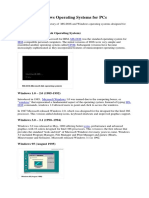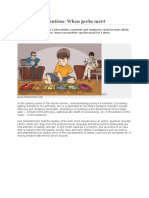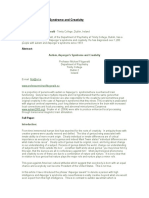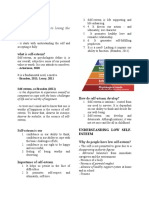0 ratings0% found this document useful (0 votes)
171 viewsThe Geek Syndrome
The Geek Syndrome
Uploaded by
AniarockoChildren with asperger's, a.k.a. The "geek syndrome," tend to sound like CDs on autoplay. About a third of the fathers or brothers of children with Aspergers show signs of the disorder. There appear to be maternal roots as well, says Dr. Fred Volkmar, a child psychiatrist at Yale.
Copyright:
Attribution Non-Commercial (BY-NC)
Available Formats
Download as DOC, PDF, TXT or read online from Scribd
The Geek Syndrome
The Geek Syndrome
Uploaded by
Aniarocko0 ratings0% found this document useful (0 votes)
171 views2 pagesChildren with asperger's, a.k.a. The "geek syndrome," tend to sound like CDs on autoplay. About a third of the fathers or brothers of children with Aspergers show signs of the disorder. There appear to be maternal roots as well, says Dr. Fred Volkmar, a child psychiatrist at Yale.
Copyright
© Attribution Non-Commercial (BY-NC)
Available Formats
DOC, PDF, TXT or read online from Scribd
Share this document
Did you find this document useful?
Is this content inappropriate?
Children with asperger's, a.k.a. The "geek syndrome," tend to sound like CDs on autoplay. About a third of the fathers or brothers of children with Aspergers show signs of the disorder. There appear to be maternal roots as well, says Dr. Fred Volkmar, a child psychiatrist at Yale.
Copyright:
Attribution Non-Commercial (BY-NC)
Available Formats
Download as DOC, PDF, TXT or read online from Scribd
Download as doc, pdf, or txt
0 ratings0% found this document useful (0 votes)
171 views2 pagesThe Geek Syndrome
The Geek Syndrome
Uploaded by
AniarockoChildren with asperger's, a.k.a. The "geek syndrome," tend to sound like CDs on autoplay. About a third of the fathers or brothers of children with Aspergers show signs of the disorder. There appear to be maternal roots as well, says Dr. Fred Volkmar, a child psychiatrist at Yale.
Copyright:
Attribution Non-Commercial (BY-NC)
Available Formats
Download as DOC, PDF, TXT or read online from Scribd
Download as doc, pdf, or txt
You are on page 1of 2
THE GEEK SYNDROME
At Michelle Winner’s social-skills clinic in San Jose,
Calif., business is booming. Every week dozens of
youngsters with Asperger syndrome file in and out of
therapy sessions while their anxious mothers run errands
or chat quietly in the waiting room. In one session,
a rosy-cheeked 12-year-old struggles to describe
the emotional reactions of a cartoon character in a
video clip; in another, four little boys (like most forms
of autism, Asperger’s overwhelmingly affects boys)
grapple with the elusive concept of teamwork while
playing a game of 20 Questions. Unless prompted to
do so, they seldom look at one another, directing their
eyes to the wall or ceiling or simply staring off into
space.
Yet outside the sessions the same children become
chatty and animated, displaying an astonishing grasp
of the most arcane subjects. Transformer toys, video
games, airplane schedules, star charts, dinosaurs. It
sounds charming, and indeed would be, except that
their interest is all consuming. After about five minutes,
children with Asperger’s, a.k.a. the “little professor”
or “geek” syndrome, tend to sound like CDs on
autoplay. “Did you ask her if she’s interested in astrophysics?”
a mother gently chides her son, who has
launched into an excruciatingly detailed description of
what goes on when a star explodes into a supernova.
Although Hans Asperger described the condition in
1944, it wasn’t until 1994 that the American Psychiatric
Association officially recognized Asperger syndrome
as a form of autism with its own diagnostic criteria. It
is this recognition, expanding the definition of autism
to include everything from the severely retarded to the
mildest cases, that is partly responsible for the recent
explosion in autism diagnoses.
There are differences between Asperger’s and highfunctioning
autism. Among other things, Asperger’s
appears to be even more strongly genetic than classic
autism, says Dr. Fred Volkmar, a child psychiatrist at
Yale. About a third of the fathers or brothers of children
with Asperger’s show signs of the disorder. There
appear to be maternal roots as well. The wife of one Silicon
Valley software engineer believes that her Asperger’s
son represents the fourth generation in just
such a lineage.
It was the Silicon Valley connection that led Wired
magazine to run its geek-syndrome feature last December.
The story was basically a bit of armchair theorizing
about a social phenomenon known as
assortative mating. In university towns and R.-and-D.
corridors, it is argued, smart but not particularly wellsocialized
men today are meeting and marrying
women very like themselves, leading to an overload of
genes that predispose their children to autism, Asperger’s
and related disorders.
Is there anything to this idea? Perhaps. There is no
question that many successful people—not just scientists
and engineers but writers and lawyers as well—
possess a suite of traits that seem to be, for lack of a better
word, Aspergery. The ability to focus intensely and
screen out other distractions, for example, is a geeky
trait that can be extremely useful to computer programmers.
On the other hand, concentration that is too
intense—focusing on cracks in the pavement while a
taxi is bearing down on you—is clearly, in Darwinian
terms, maladaptive.
But it may be a mistake to dwell exclusively on the
genetics of Asperger’s; there must be other factors involved.
Experts suspect that such variables as prenatal
positioning in the womb, trauma experienced at birth
or random variation in the process of brain development
may also play a role.
Even if you could identify the genes involved in Asperger’s,
it’s not clear what you would do about them.
It’s not as if they are lethal genetic defects, like the ones
that cause Huntington’s disease or cystic fibrosis.
“Let’s say that a decade from now we know all the
genes for autism,” suggests Bryna Siegel, a psychologist
at the University of California, San Francisco.
“And let’s say your unborn child has four of these
genes. We may be able to tell you that 80% of the people
with those four genes will be fully autistic but that
the other 20% will perform in the gifted mathematical
range.”
Filtering the geeky genes out of the high-tech breeding
grounds like Silicon Valley, in other words, might
remove the very DNA that made these places what
they are today.
You might also like
- Introduction To Qualitative Research Methods 1707864706Document328 pagesIntroduction To Qualitative Research Methods 1707864706Dhruv PandeyNo ratings yet
- Joe Vitale - Hypnotic Selling ToolsDocument68 pagesJoe Vitale - Hypnotic Selling Toolsapi-3808863100% (6)
- What Is Learning Anyway? A Topographical Perspective ConsideredDocument18 pagesWhat Is Learning Anyway? A Topographical Perspective ConsideredCristian SalazarNo ratings yet
- BDA Heath and Safety Manual For Land DrillingDocument189 pagesBDA Heath and Safety Manual For Land Drillingshahid aliNo ratings yet
- Dyslexia Linked To Talent: Global Visual-Spatial AbilityDocument5 pagesDyslexia Linked To Talent: Global Visual-Spatial AbilityMaggý MöllerNo ratings yet
- A Nine-Step Guide To Fast, Effective Business WritingDocument3 pagesA Nine-Step Guide To Fast, Effective Business WritingsudeepmohapatraNo ratings yet
- Goldenrocks-Laser and Photgrammetric Methods Rock Face CharacterisationDocument120 pagesGoldenrocks-Laser and Photgrammetric Methods Rock Face CharacterisationandresmaureiravNo ratings yet
- Friends Episode GuideDocument10 pagesFriends Episode GuideEthan AltNo ratings yet
- Semi - Detailed Lesson Plan For C.O. (4TH Quarter)Document4 pagesSemi - Detailed Lesson Plan For C.O. (4TH Quarter)May Ann C. Payot100% (4)
- My Leadership Development PlanDocument8 pagesMy Leadership Development Planapi-260120536100% (1)
- Geek - Syndrome Aspergers SyndromeDocument11 pagesGeek - Syndrome Aspergers SyndromealicyumssolaceNo ratings yet
- Black, M. H., Mahdi, S., Milbourn, B., Scott, M., Gerber, A., Esposito, C., Girdler, S. (2020) - Multi Informant International Perspectives OnDocument20 pagesBlack, M. H., Mahdi, S., Milbourn, B., Scott, M., Gerber, A., Esposito, C., Girdler, S. (2020) - Multi Informant International Perspectives OnTomislav CvrtnjakNo ratings yet
- Identifying and Managing Moments That Matter To Employees: Gartner For HRDocument33 pagesIdentifying and Managing Moments That Matter To Employees: Gartner For HRFelipe FujiiNo ratings yet
- Geomorphological Roulette For EngineersDocument42 pagesGeomorphological Roulette For EngineersNathan VincentNo ratings yet
- Rheological Properties (Terminology)Document18 pagesRheological Properties (Terminology)adNo ratings yet
- Referencing Guide: Running Notes StyleDocument37 pagesReferencing Guide: Running Notes StyleHasty LarasatiNo ratings yet
- Origins For The Estimations of Water Requirements in AdultsDocument8 pagesOrigins For The Estimations of Water Requirements in AdultsFaza Yasira RusdiNo ratings yet
- Concrete Admixtures: Specification Accelerating and Retarding Water-Reducing AdmixturesDocument22 pagesConcrete Admixtures: Specification Accelerating and Retarding Water-Reducing AdmixtureskushanNo ratings yet
- Roundtable DiscussionsDocument2 pagesRoundtable DiscussionsEmi ThavaNo ratings yet
- Mayne & Peuchen (2018) - CPTu NKT For Su in ClaysDocument6 pagesMayne & Peuchen (2018) - CPTu NKT For Su in Clayschin_kbNo ratings yet
- EDI Maturity and The Competitive EdgeDocument8 pagesEDI Maturity and The Competitive EdgekuwsendiriNo ratings yet
- The Autistic Spectrum: SeminarDocument6 pagesThe Autistic Spectrum: SeminarMilton ObandoNo ratings yet
- A Review of Geological ModelingDocument6 pagesA Review of Geological ModelingWang Xu WangNo ratings yet
- 5075 1 1982 PDFDocument23 pages5075 1 1982 PDFhz135874No ratings yet
- Microsoft Windows Operating Systems For PCsDocument4 pagesMicrosoft Windows Operating Systems For PCsNafta PutraNo ratings yet
- British Standard: A Single Copy of This British Standard Is Licensed ToDocument29 pagesBritish Standard: A Single Copy of This British Standard Is Licensed TodamithNo ratings yet
- Jrc115352 OnlineDocument66 pagesJrc115352 OnlineMilchoNo ratings yet
- History of Computer PrintersDocument2 pagesHistory of Computer PrintersMochamadM.AvivNo ratings yet
- 1998-03 Pages 38-41 PDFDocument4 pages1998-03 Pages 38-41 PDFMu Hardi100% (1)
- Settlement Settlement of Shallow Footings On Layered Soil State of The Art of Shallow Footings On Layered Soil State of The ArtDocument8 pagesSettlement Settlement of Shallow Footings On Layered Soil State of The Art of Shallow Footings On Layered Soil State of The ArtAnshuman SinghNo ratings yet
- Critical Review Tailing Dam Best PracticeDocument31 pagesCritical Review Tailing Dam Best PracticeFelipe Ignacio Campos RodriguezNo ratings yet
- Professor David Norbury PDFDocument53 pagesProfessor David Norbury PDFArabel Vilas SerínNo ratings yet
- Reliability-Based Design and Its Complementary Role To Eurocode 7 Design ApproachDocument15 pagesReliability-Based Design and Its Complementary Role To Eurocode 7 Design ApproachIbnu RiswanNo ratings yet
- Scientists and AutismDocument6 pagesScientists and AutismJheelzy DatorNo ratings yet
- In A Different Key by John Donvan & Caren Zucker-ExcerptDocument15 pagesIn A Different Key by John Donvan & Caren Zucker-ExcerptCrown Publishing Group100% (1)
- Robert Trivers PDFDocument7 pagesRobert Trivers PDFCris BañadosNo ratings yet
- Clayton Geotech RiskDocument9 pagesClayton Geotech Riskkoriki.choshuNo ratings yet
- McKinsey's Three HorizonsDocument5 pagesMcKinsey's Three HorizonsHenrique MonteiroNo ratings yet
- Correlation UCS and Point Load IndexDocument8 pagesCorrelation UCS and Point Load IndexyandipuNo ratings yet
- Deflocculation of Concentrated Aqueous Clay Suspensions With SodDocument5 pagesDeflocculation of Concentrated Aqueous Clay Suspensions With SodkhosrosaneNo ratings yet
- Application of A One-Dimensional Large-Strain Consolidation Model To A Fullscale Tailings Storage Facility PDFDocument11 pagesApplication of A One-Dimensional Large-Strain Consolidation Model To A Fullscale Tailings Storage Facility PDFchenNo ratings yet
- How To Take Offense Responding To Microaggression Rini2018Document20 pagesHow To Take Offense Responding To Microaggression Rini2018Salman TahirNo ratings yet
- Methods For Assessment and Identification of Dispersive SoilsDocument7 pagesMethods For Assessment and Identification of Dispersive SoilsSuraj BhattaraiNo ratings yet
- Secondary Compression Behavior in One-Dimensional Consolidation TestsDocument6 pagesSecondary Compression Behavior in One-Dimensional Consolidation TestsBookAncestorNo ratings yet
- NZ Ground Investigation Specification Vol 2 Rev 0Document21 pagesNZ Ground Investigation Specification Vol 2 Rev 0KTMONo ratings yet
- Entire Engineering and Design - Sampling and DataDocument377 pagesEntire Engineering and Design - Sampling and DataLTE002No ratings yet
- Settlement of Circular Footing On SandDocument26 pagesSettlement of Circular Footing On SandninoronaldNo ratings yet
- Hunt 2014 Tunneling in Cobbles and Boulders, FDocument38 pagesHunt 2014 Tunneling in Cobbles and Boulders, FswhuntNo ratings yet
- Stability Analysis and Modelling Underground Excavations in Fractured Rocks - Vol 1Document309 pagesStability Analysis and Modelling Underground Excavations in Fractured Rocks - Vol 1p4wr8xyqg8No ratings yet
- Tailings Dams - From The Perspective of Conventional Dam EngineeringDocument7 pagesTailings Dams - From The Perspective of Conventional Dam EngineeringNihat AtamanNo ratings yet
- Surface Site Characterization For On-Site Septic SystemsDocument4 pagesSurface Site Characterization For On-Site Septic SystemsSFC ABHA 1No ratings yet
- Mylonakis Gazetas SSI JEE 2000Document27 pagesMylonakis Gazetas SSI JEE 2000ricardomartinzevalloNo ratings yet
- Evaluation of Shansep ParametersDocument178 pagesEvaluation of Shansep Parametersshachen2014100% (1)
- Opinions of People Who Self-Identify With Autism and Asperger's On DSM-5 CriteriaDocument11 pagesOpinions of People Who Self-Identify With Autism and Asperger's On DSM-5 CriteriaAndrés SánchezNo ratings yet
- Poulos GeoLegendDocument7 pagesPoulos GeoLegendTony ChanNo ratings yet
- Improving The Duckworth Lewis Stern Method For Better Outcomes in Rain-Affected Cricket MatchesDocument16 pagesImproving The Duckworth Lewis Stern Method For Better Outcomes in Rain-Affected Cricket MatchesSai MehtaNo ratings yet
- Select Liquefaction Case Histories From The 2010-2011 Canterbury Earthquake SequenceDocument23 pagesSelect Liquefaction Case Histories From The 2010-2011 Canterbury Earthquake SequencemmNo ratings yet
- Geostatistics Without Tears PDFDocument116 pagesGeostatistics Without Tears PDFeusoruimNo ratings yet
- Monitoring Ground Movement Using Probe-Type Inclinometers: Standard Test Method ForDocument8 pagesMonitoring Ground Movement Using Probe-Type Inclinometers: Standard Test Method ForJose Luis Ayala Manayay100% (1)
- Costs Camouflaging AutismDocument7 pagesCosts Camouflaging AutismAngela ZambranoNo ratings yet
- The Best Kind of Different: Our Family's Journey with Asperger's SyndromeFrom EverandThe Best Kind of Different: Our Family's Journey with Asperger's SyndromeNo ratings yet
- Autism in Girls 2Document5 pagesAutism in Girls 2api-535070577No ratings yet
- Autism, Aspebergers, and CreativityDocument6 pagesAutism, Aspebergers, and CreativityKara SchwartzNo ratings yet
- Your Own Mind Will Be The Killer: and Everyone Feels Extremely Sad or Angry Sometimes in His or Her Life. Those EmotionsDocument2 pagesYour Own Mind Will Be The Killer: and Everyone Feels Extremely Sad or Angry Sometimes in His or Her Life. Those EmotionsrenNo ratings yet
- Topik 2 Research Methods in IODocument25 pagesTopik 2 Research Methods in IOBaobei NisaNo ratings yet
- Mindful Vs Concentration MeditationDocument2 pagesMindful Vs Concentration MeditationGa NaNo ratings yet
- Mental Health Social Work Dissertation TopicsDocument7 pagesMental Health Social Work Dissertation TopicsWriteMyPaperCheapSiouxFalls100% (2)
- Phases of TeachingDocument12 pagesPhases of TeachingKanagu RajaNo ratings yet
- Teacher: Course: Section:: Ronald O. de Lemios Understanding The Self (UTS)Document3 pagesTeacher: Course: Section:: Ronald O. de Lemios Understanding The Self (UTS)Ronnil Vm MacaroNo ratings yet
- 2008 - Brunell Et Al Case of The Narcistic Leader - tcm263 883929 PDFDocument14 pages2008 - Brunell Et Al Case of The Narcistic Leader - tcm263 883929 PDFFaizan UllahNo ratings yet
- LAN 1153 - 3C - Sample Final 2021Document5 pagesLAN 1153 - 3C - Sample Final 2021Асель АлиеваNo ratings yet
- Critical Thinking QuestionsDocument2 pagesCritical Thinking QuestionsJulie Ann EscartinNo ratings yet
- Academic Coping Strategies of Grade 7 Students in The Division of Lipa City - Dr. Ernesto P. Badillo-Keywords: Academic, Coping Strategies, Lipa CityDocument9 pagesAcademic Coping Strategies of Grade 7 Students in The Division of Lipa City - Dr. Ernesto P. Badillo-Keywords: Academic, Coping Strategies, Lipa Cityjonathan ProllamanteNo ratings yet
- Kashi Naresh Government Post Graduate College Gyanpur, Bhadohi U.PDocument12 pagesKashi Naresh Government Post Graduate College Gyanpur, Bhadohi U.PAbdullah KhanNo ratings yet
- Paul Eckman Emotii Date Pe FataDocument248 pagesPaul Eckman Emotii Date Pe FataChacotototote0% (6)
- Edu-220 Case Study 1Document12 pagesEdu-220 Case Study 1api-438880639No ratings yet
- Current Theories Relating To Resilience and Young PeopleDocument44 pagesCurrent Theories Relating To Resilience and Young Peoplejonathan planas100% (1)
- Chapter 1 - ReportingDocument18 pagesChapter 1 - ReportingCee JayNo ratings yet
- Bea 5 RRLDocument2 pagesBea 5 RRLmadrino.beamaureenNo ratings yet
- The Moral Agent: Developing Virtue As HabitDocument20 pagesThe Moral Agent: Developing Virtue As HabitshanecamilledlamosteNo ratings yet
- What It Really Means To Loving The Self?Document4 pagesWhat It Really Means To Loving The Self?Ivy AguasNo ratings yet
- Cross Cultural Differences Between India and NetherlandsDocument17 pagesCross Cultural Differences Between India and NetherlandsBhushan SoniNo ratings yet
- Mental Health TriptychDocument3 pagesMental Health TriptychScribdTranslationsNo ratings yet
- Paraphilic DisordersDocument18 pagesParaphilic DisordersJenny ChiocoNo ratings yet
- Oral Com m1 (L 3) Functions of CommunicationDocument4 pagesOral Com m1 (L 3) Functions of CommunicationB2 Frondozo, MarjorieNo ratings yet
- HFD Emotional IndicatorsDocument3 pagesHFD Emotional IndicatorssanaNo ratings yet
- Unit 7: Written ComprehensionDocument3 pagesUnit 7: Written Comprehensiondaniel.larraz.2006No ratings yet
- NTN Oral Communication Rubric Elementary School Grade 2Document4 pagesNTN Oral Communication Rubric Elementary School Grade 2El-jhei Corpuz QuilangNo ratings yet
- Reflective Journal Day 1Document2 pagesReflective Journal Day 1Flatiel VilanculosNo ratings yet
- Abnormal Psych Question 2Document12 pagesAbnormal Psych Question 2Ronald Jacob Picorro100% (1)

























































































